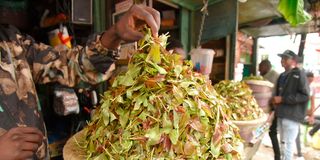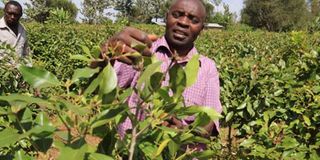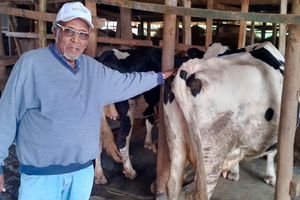
Muguka arrives at Kongowea Market after the lifting of the ban at the Coast.
A recommendation by the Mombasa County Assembly Health committee in 2019 for a total ban of muguka in the port city was rejected, leaving the region in an unending debate over the effects of the stimulant to the local community.
The study undertaken at a time when the stimulant was gaining popularity in Mombasa, had confirmed that the consumption of muguka had caused health and socio-economic effects among the youths, posing a threat to the productivity of Mombasa County.
In the survey done across all the 30 wards in the six sub-counties of the devolved unit, it was revealed that there was dependence of the stimulant among the users with substantial number experiencing craving and consuming it in excessive quantities.
However, the report was never adopted by the then county assembly with some committee members citing interference by political and business interests.
Apart from the committee’s proposals, several motions had in the earlier years been presented before the county assembly to regulate miraa and muguka trade and usage in the county.
However, these too were shot down by majority MCAs.

Muguka traders display their wares in Nakuru City
Miritini MCA Kibwana Baya who chaired the committee told the Nation that the study was initiated because there was a worrying trend in escalation of muguka consumption among the most productive age groups in the county.
According to Mr Baya, this trend had a potential to cause an increase of health effects which was likely to compromise the county's efforts in achieving the Mombasa County Vision 2035.
“The debate we are having now could have been solved as early as May 2019, when the report was published but unfortunately was not adopted because of politics, which led to the recommendations of input of more experts from Kenya Medical Research Institute and Oxford Learning Institute,” said Mr Baya.
Based on the evidence adduced, the committee recommended a ban imposed on muguka use in Mombasa County and the county legislate law to govern an enforcement of the ban. The county was also supposed to form a team to sensitise community on health and socio-economic effects of muguka and rehabilitate those affected.
The Nation has found out that business interests also played a part in the rejection of the report which had the input from a research team led by Dr Rashid Kaka, the Director of Research at the County Assembly, the National Campaign Against Drug and Alcohol Abuse (Nacada) and several other health experts.
The survey which was carried out between August and September 2018 had targeted persons below 10 to 45 years and above and was designed to provide a holistic view of muguka use in Mombasa County.
This study revealed that the highest numbers of muguka users were in the age groups of 19-30 and 31-44 years, with Kisauni and Nyali sub-counties leading with 36.3 per cent and 37.4 per cent respectively.

Mr Francis Kimori, chairman of Mbeere Muguka Sacco tends his crop at Kiamuringa, Embu County on May 4, 2016. The farmers are demanding a share of the Sh1 billion kitty to be allocated to miraa farmers in Meru. PHOTO | CHARLES WANYORO | NATION MEDIA GROUP
In a break down of the age groups, it was revealed that those between 19-30 years were majorly in Mvita Sub-County with 44.2 per cent, followed closely by Nyali (43.2 per cent), Jomvu (40.3 per cent), Kisauni (39.7 per cent), Changamwe (36.1 per cent) and Likoni (28.3 per cent).
In the under-age cluster of 11-18 years, Kisauni Sub-County led with 43.2 per cent, followed by Nyali (33 per cent) and Likoni (26.7 per cent).
In a break down by wards, the study showed that Miritini ward led with 62.5 per cent in the use of muguka followed by Mtopanga (57.5 per cent) and Tononoka (53.8 per cent). Mtongwe was at (12.8 per cent), Jomvu Kuu (14.8 per cent) and Ziwa la Ng’ombe (17.5 per cent).
This study revealed that male users of muguka were experiencing negative health effects more than females where 36.5 per cent of males suffered from various health effects, compared to 25.6 per cent in women.
The study established that muguka users suffered from social health effects with about 45 per cent suffering from stigma while others were discriminated against (35 per cent).
According to the report, mental health patients admitted at the Port Reitz hospital said they had been using muguka more than once a day (30.2 per cent) or every day (20.9 per cent).
Although they could not ascertain the exact quantities used daily, most of these respondents confirmed that it was approximately 1kg per day.
Above all, this study showed over 70 percent of the respondents lose resources in terms of money and time due to muguka use as well as over 25 percent indicating reduced productivity.










